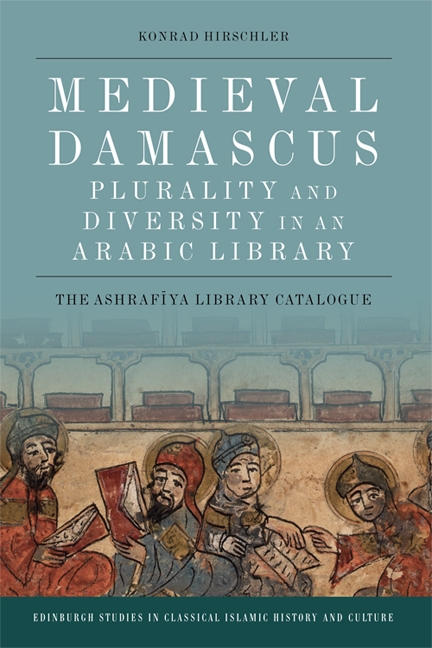Book contents
- Frontmatter
- Contents
- List of Illustrations
- Acknowledgements
- Introduction
- 1 The Making and Unmaking of a Medieval Library
- 2 Organising the Library: The Books on the Shelves
- 3 Plurality and Diversity: The Profile of a Medieval Library
- 4 The Ashrafīya Catalogue: Translation and Title Identification
- 5 The Ashrafīya Catalogue: Edition
- Bibliography
- Index of Subjects
- Index of Titles
- Index of Authors
- Index of External Categories
- Frontmatter
- Contents
- List of Illustrations
- Acknowledgements
- Introduction
- 1 The Making and Unmaking of a Medieval Library
- 2 Organising the Library: The Books on the Shelves
- 3 Plurality and Diversity: The Profile of a Medieval Library
- 4 The Ashrafīya Catalogue: Translation and Title Identification
- 5 The Ashrafīya Catalogue: Edition
- Bibliography
- Index of Subjects
- Index of Titles
- Index of Authors
- Index of External Categories
Summary
This is the story of a medieval Arabic library. Positioned in the centre of seventh-/ thirteenth-century Damascus, part of an educational institution and endowed by members of the political and social elite there is nothing too unusual about the Ashrafīya library. In many ways it is a run-of- the- mill library of which dozens probably existed in Damascus and hundreds more in the various Syrian and Egyptian cities. Yet this library differs in one significant way from all of its counterparts: its catalogue has come down to us. Library catalogues do not sound like the most exciting documents we can lay our hands on and this book is certainly not the Middle Eastern equivalent to Umberto Eco's Name of the Rose (although the first shaykh to preside over the library's mother institution did fall victim to a highly suspicious and unsolved murder). Rather this library catalogue is so valuable because it opens a door into a pre-print world of books and shelves, which was at the very heart of society but was hitherto largely inaccessible.
For the first time we are able to gain a detailed insight into what books were held in such a medieval Arabic library and thus its intellectual profile. William of Baskerville would not have found Aristotle's Book on Comedy on the library's shelves, but at least eighteen other titles ascribed to Aristotle, Plato, Galen and Socrates would have been available to him among the 2,000 books in its stock. The catalogue also allows us to understand for the first time how the books were actually organised on the shelves (How do we make the books retrievable?) and it allows us to grasp the spatial dimensions of a medieval library (How do we cram all of these books into such small places?). Finally, for the first time one can follow the nuts and bolts of founding a medieval library in the Arabic Middle East (From where do we get the books?) and of running it in the subsequent decades and centuries (How do we prevent those folks from running off with the books?). The catalogue was known to the great scholar of manuscripts Ramazan Şeşen, who briefly cited it in some of his publications from the 1970s onwards.
- Type
- Chapter
- Information
- Medieval Damascus: Plurality and Diversity in an Arabic LibraryThe Ashrafiya Library Catalogue, pp. 1 - 16Publisher: Edinburgh University PressPrint publication year: 2016



